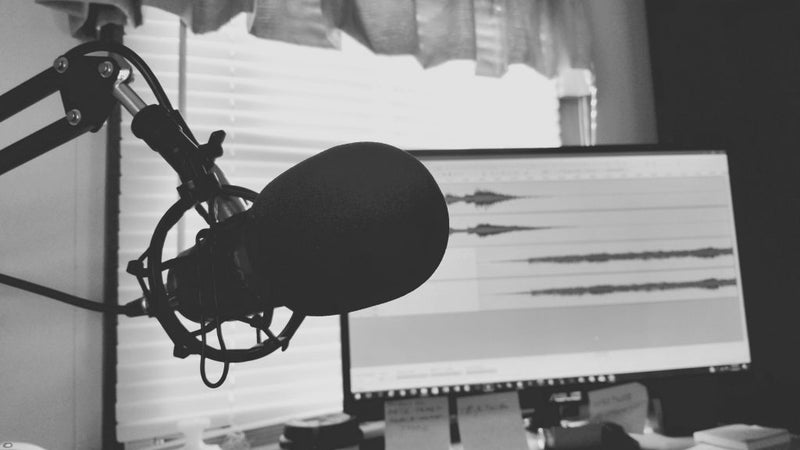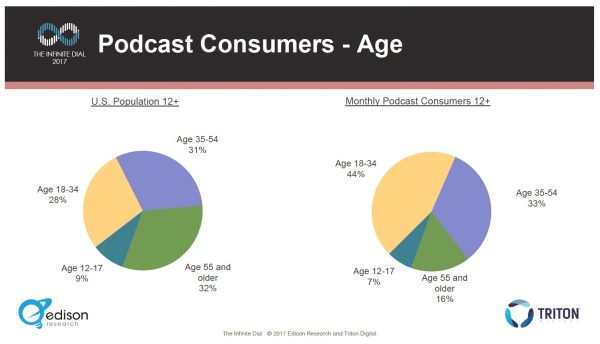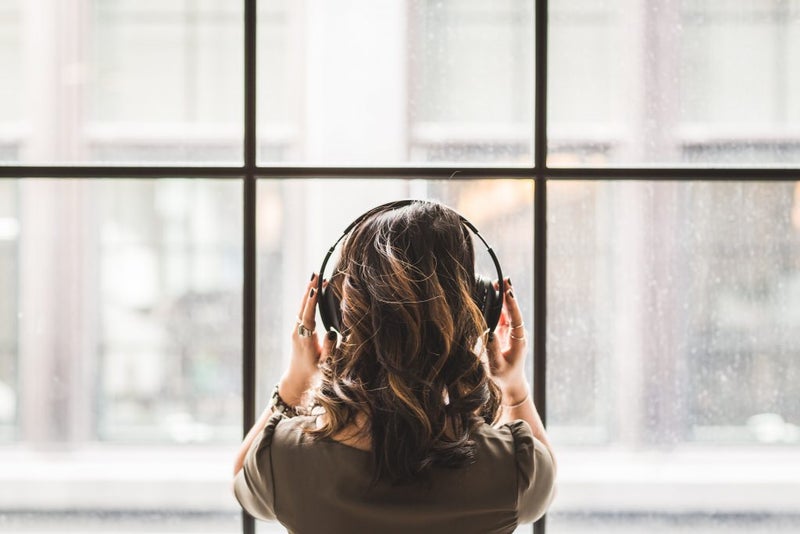You listen to podcasts. If not, you certainly know what they are. You can see their value: they’re funny, they’re interesting, they’re useful. But can your business leverage the power of this years-old, perennial favourite and still-growing format?

Google search trend for ‘podcast’ over the last 5 years.
This article will help you assess whether you SHOULD start a podcast. And, if you should, how you can ensure that you create a podcast that will engage your audience, build your brand and create advocates who buy from you.
What are the benefits of podcasting
The first question with content format choice is: what is the best possible way to communicate the thing we want to communicate? Is it video? Maybe simple text on a page will do.
- New format
- A key benefit of podcasting is that it opens up a very human, audio-only avenue for content
- Mobile
- It also makes the format highly mobile with people able to listen on the move or while doing other activities – exercising, commuting, driving
- Brand
- If you have engaging personalities or great experts (or both) podcasting can highlight these strengths effectively. This means it can be a great brand builder, showing your people, your values, your expertise. It can bring a company to life!
- Content
- Audio is often a great way to explore complex or nuanced topics – allowing for a level of detail that can be hard to write – and hard to read
- Engagement
- According to MIDAS data, 65.1 million hours of podcast listening took place each week in 2019 in the UK alone, a 50% increase on 2018. While podcasts are not THE most effective or cost-effective way of reaching audiences, they CAN offer deeper engagement as they can facilitate genuine dialogue between brand and audience. This helps to create advocates and even drive increased actions (sales, clicks, sharing).
If your podcast is particularly successful, you may even be able to make some money from it – usually through sponsorship (though few people ever got rich from their podcast alone).

Why podcasting works
- Time
- Writing a high-quality article of 1,000-2,000 words can take a day or more depending on source material. Video can take a long time to produce due to logistics, locations and the various stages of editing (which might include storyboarding or creating idents). Depending on the amount of editing you require (removing umms-aahs and any mistakes) a podcast will take less time to edit and publish than it does to record, making it possible to produce more content, quicker.
- Money
- Video can take a long time to create and/or lots of money to produce well. But podcasts can be produced with the hardware available on your phone and free software on your laptop
- You can also find free library music and idents
- We are humans
- Humans like humans. We like voices – the emotion, the laughter, the conflict
- We also like to be part of a conversation, and a podcast is the illusion of being a part of one
- Is it any wonder that radio – and talk radio – has remained so popular for 100 years
- On-demand
- Podcasting is radio for the 21st century: in-demand ‘shows’ you can listen to where and when you want
- Niche
- Multiple hours of the thing that you and your community are particularly interested in – allowing long, deep dives into subjects, rather than having to keep thing broad and light for a mainstream audience
- While this is great for those interested in any topic – from archaeology to ASMR, comedy to politics – it also allows brands to find ready-made audiences interested in certain topics
- SEO
- Conversation – and even monologues – can be a great source of written content. Apps such as Otter AI allow you to effectively transcribe a podcast which you can publish as a blog on your site. You may find your blog can drive traffic from Google
- Networking
- Some podcasters use the platform to build relationships with people in a given field – from academic to professional. By inviting people on to your podcast you are initiating a relationship that may otherwise not have happened. You may be able to leverage that relationship to extend your brand reach, give credibility or even start commercial partnerships.
It must be added that podcasters still face certain challenges. A key one is discoverability. Unless someone is specifically searching for podcasts, Google may not present them for many searches. Also, searching within podcast platforms means fierce competition with established podcasts that algorithms will favour.
Should I podcast? And how do I know
All sounds great, right? Yes, but should YOU start a podcast? For every Joe Rogan Experience, West Wing Weekly and My Dad Wrote A Porno, there are hundreds of podcasts that receive low to no listens. This will be because of one or all of these factors:
- Podcast was not the best format to reach the audience with the content
- The execution was poor – poor sound, boring hosts, infrequent/irregular episodes
- It wasn’t promoted.
Before you start working up a logo and creating a Soundcloud account, run through this checklist:
- Which came first?
- Our idea for a podcast is X, or
- We should do a podcast
If it’s the latter, go directly to jail, do not pass Go, do not collect £200.
- Do you have an audience?
- Does your audience listen to podcasts about the thing you do (or want to talk about)? If you want to reach people 55+, then you might want to rethink…

- Do you have a USP? Lots of other podcasts about your topic, can be a good sign that there is an audience, but you will need something that sets you apart – especially if there are lots of other podcasts
- Do you have the skills?
- Are you able to capture broadcast quality audio (or near) with the equipment you have (or are prepared to buy)? And can your interviewees?
- Can you edit audio? Or learn to?
- Do you have the talent?
- Is you or one of your team the kind of person who people will listen to for extended periods? Are they charming, funny, interesting or fantastically knowledgeable about what they do? As Podcast.co state: “If you decide to launch an interview podcast, pretty much everything hinges on the person asking the questions. If they lack charisma or can’t keep a conversation on track, they listeners will quickly switch off.”
- Do you have the time?
- Can stakeholders devote the time to regularly creating a podcast? While it might be less time-consuming than writing a blog, there is time involved
- Do you have the cash?
- Will your business support the podcast with the promotion required to ensure you reach your audience.
What should your podcast be?
So, you’ve decided it’s the right format for you. Now it’s time to flesh out what it will be. You will need to define:
- Personnel
- Who’s going to be on your podcast? Who will host? And who will be the co-host or interviewee(s)? Does the host know how to host?
- Topics
- Define the broad topic area that your podcast will cover, and then define tight parameters for each episode. Your host should create topics or even questions to ensure that the conversation keeps moving – and in the right direction
- Ensure the topic area is not just, ‘us and what we do’, because unless you’re a Hollywood director or Daft Punk, no one cares. Let the needs, concerns and values of your audience drive the topic
- Recording
- Will you record in person with your guest, or remotely? How will you capture audio? How will your guest capture audio
- Will the audio be good enough quality?
- Length
- The beauty of a podcast is that it can be as long or short as you like, but you should decide an ideal length. This should be based on how much time you think your audience are happy to devote to listening to the people and the subject, AND how much time stakeholders can give to the endeavour. You might start off at 20 minutes and observe the response. More than an hour would seem excessive. Because many people listen while exercising or commuting, it is wise to create something that can fit neatly in that time.
- Format/programming
- Write down the flow of your podcast, for example:
- Introduction to the podcast and who we are
- Housekeeping (follow us, subscribe, how to get involved)
- Headlines read by host
- Interview part 1
- Break for sponsor message
- Interview part 2
- Outro (thanks, how to engage, next episode)
- Write down the flow of your podcast, for example:
This is to help your host steer the show. This formatting will also create a nice regular rhythm that the audience become familiar with
- Frequency
- As with length, how much time are your audience prepared to give to this topic in this format? People listen to music, film and sport podcasts for hours every week, but 30 minutes per month might be enough for those in some industries
- Regularity
- Rhythm is essential. Successful media has always fit into people’s routines, from daily newspapers and monthly magazines to weekly TV shows and seasonal specials. Will your podcast be the thing people listen to on their Monday commute? Or download on the first of every month?
- Rome wasn’t built in a day and even the most successful podcasts can take time to become such. The key is to stick with it: regularly publish, continue to promote and improve as success will only come over the long term
Channels
Where will you publish your podcast?
There are dozens of podcast platforms and audio-only platforms such as Mixcloud and Soundcloud as well as YouTube – which hosts many successful audio-only podcasts – and subscription services such as Spotify.
It can be a great idea to upload your podcast to an aggregator such as Buzzsprout. Upload your podcast, graphic and synopsis once and it will publish to more than a dozen podcast platforms including iTunes/Apple Podcasts, Spotify, Deezer, Amazon Echo and others.
Don’t discount YouTube. Your podcast may be audio-only, but YouTube is a great channel for discovery (unlike The Discovery Channel). Even audio-only videos (if that’s not too much of a contradiction) can gain huge viewing figures. Writer and broadcaster Sam Harris receives 40k-200k views of his audio podcast on YouTube. Simply create a video file, drop in your audio and select an image to be the graphic for the length of your podcast, export and upload.
Some podcasts start off audio-only, but expand into video, and with the proliferation of free video conferencing software such as Zoom, many people simply record their screens and audio, for example US writer Coleman Hughes.
Promotion
This section should be higher up the page, because it’s utterly essential. You can create a blog and, if you’ve consulted a friendly SEO, it might start to drive some traffic, but podcasts need to be pushed. If you tell no one, no one will listen because no one will know. It is essential to allocate budget to promote your podcast on channels such as social media. You may also PR episodes and/or conduct influencer outreach to ensure your podcast reaches its desired audience.
- Social media boosting (organic alone will not work)
- Soundcloud, in-channel promotion
- Influencer outreach
- PR

Measurement: What does success look like?
Not everything that is important is measurable, just as not everything that is measurable is important. And unfortunately podcasting is a digital format that offers little in the way of meaningful metrics. But, as the aphorism above suggests, that it is not to say that podcasts cannot reach and engage audiences. The key is to look at the success of your podcast in the round, rather than having narrow KPIs:
- Listens and downloads
- This is an obvious one, but this doesn’t capture how many people ‘listened’ all the way through, or how many people played the podcast once it was ‘downloaded’
- Assuming all things are equal (re: promotion and reach) you should keep an eye on whether the figures are growing or declining. Decline suggests people liked the idea, but don’t like the execution – and you may have to go back to the drawing board
- Engagement on social
- People will like things they haven’t even seen/heard, so pay more attention to comments
- Internal stakeholders
- Ask your teams whether they like it. And ask them to let you know if any of their contacts have listened to it and what they thought of it
- Third-parties
- What do influencers make of it? Ask if they like it? If they’re sharing it, you might deduce that they are. A good sign
- Unique codes
- Some podcasts introduce unique codes to see how many people will engage with a given promotion or initiative
- Audience engagement
- You might ask people for the questions or suggestions and see what comes back. This might give you an idea of who’s listening
- Ratings
- Many podcast platforms allow users to like or rate a podcast. Encourage listeners to do so in each episode and you can see whether you get any love…
After 6 months of regular, frequent podcasts and promotion, if all you see and hear is empty silence, it’s probably safe to say, no one’s listening. But if you can see that listen/download stats are rising (no matter how small), if those you work with generally seem positive about it and if you’re getting online interaction social or via email, it’s worth persevering.
Examples
Here are a few great examples of businesses creating podcasts:
- Health care provider Aetna International’s Fit For Duty podcast
- Johnson & Johnson’s Innovation Podcast
- Escape Fitness’s Escape Your Limits podcast
Can creating a podcast add additional value to your content marketing strategy? If you’d like to find out more about how Gravity Global can help you, say hello at hello@www.gravityglobal.com or visit our contact us page here.
Share
Subscribe




